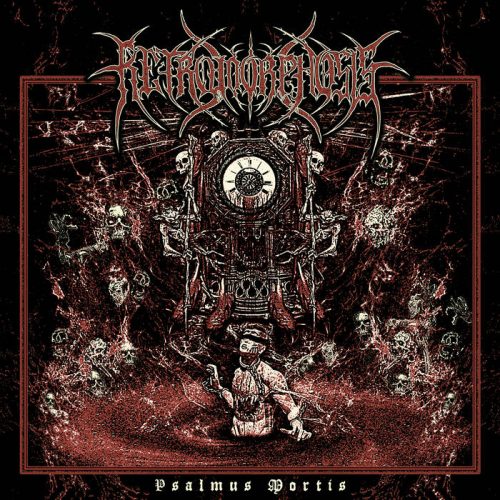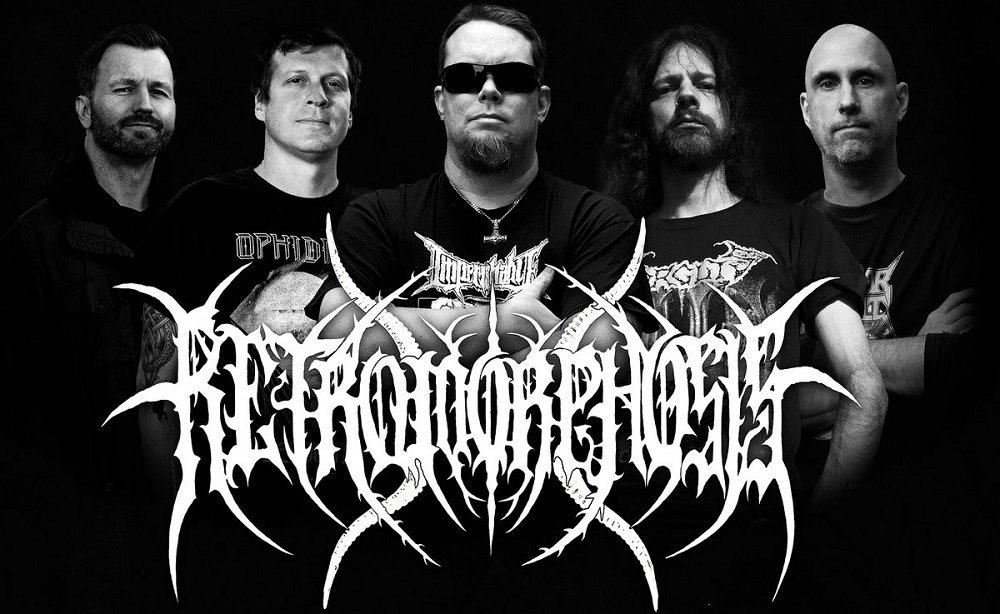
(Andy Synn discusses questions of legacy and rebirth while singing the praises of Retromorphosis)
Look, there’s no way to talk about Retromorphosis without also talking about the elephant in the room.
After all, a lot of people feel (with good reason) that Psalmus Mortis is basically the long-awaited 4th Spawn of Possession album in all but name, especially since four out of five of the people behind the recording are ex-Spawn alumni (although only guitarist Jonas Bryssling and vocalist Dennis Röndum are SoP originals).
This, however, creates two potential problems for any budding reviewer.
On one hand you’ve got the question of how to address the expectations of the group’s fanbase, some of whom have already declared it “Album of the Year”, while others are convinced there’s no way it can live up to the band’s legacy – both prior to actually hearing it, I might add – without pandering to or dismissing their concerns.
Then, on the other, there’s the issue of how to put the album in its proper context – after all, it’s been just under thirteen years since SoP‘s third (and final) album was released, and during that time the Technical Death Metal scene has mutated and metastisized so much, spawning (no pun intended) a myriad of new strains and new variants, that it’s understandable if you’re wondering where exactly Retromorphosis are going to fit in.
Well, wonder no longer, because you’re about to find out all that… and more!

Now, whether you’re already familiar with their prior work(s) or not, it’s impossible to escape the fact that Retromorphosis is very much a “super-group” of superfluously talented musicians whose notoriety in the Death Metal scene comes from also having major names like Blood Red Throne, Deeds of Flesh, Alkaloid, and Necrophagist on their CV (and that’s just counting bassist Erlend Caspersen and guitarist Christian Münzner).
The playing, therefore, is absolutely top-notch, with both Münzner and former SoP/current Retromorphosis mastermind Jonas Bryssling bringing their A-game, with the latter showing off both his distinctive brand of artisanal riff-craft and instinctive grasp of fluid dynamics on songs like early highlight “Vanished” and the morbidly moody “Never to Awake”, while the former adds his signature flair and flash to the proceedings (especially when allowed to really cut loose with some dazzling fretboard fireworks, as he does throughout “Aunt Christie’s Will”) in a way that feels less creatively confined than his most recent work in Obscura might have.
At the same time the rhythm section of Caspersen and drummer KC Howard (Decrepit Birth, Odious Mortem) lock in so tightly that you’d be forgiven for thinking they’d been playing together for years – with every twang and pop and boom of the bass punching through in the mix alongside a truly ferocious flurry of strafing snare blasts and rapid-fire fills – while vocalist Dennis Röndum spits and snarls and growls his way through every track with a performance which feels as vital and visceral today as it did ten years ago.
But here’s the thing… ultimately it’s not the technicality of the music (which, while undoubtedly impressive, is perhaps a little more restrained than “classic” SoP) that makes Psalmus Mortis so appealing, it’s the strength of Bryssling’s songwriting, which retains that same sense of unrelenting, irresistible forward motion – the title-track in particular is a prime example of how every riff, every groove, every burst of blasting fury, organically builds on what went before – that made Cabinet, Noctambulant, and Incurso so impossible to put down.
As part of this, the unsettling synths and eerie vibes underlying the music (keep an ear out during maddening mid-album highlight “The Tree”, for example) add a subtle strangeness to the band’s sound which feels like an interesting creative evolution, with penultimate nine-minute epic “Machine” allowing Bryssling to expand and explore his compositional ambitions even further (building on the success of Incurso‘s extravagant eight minute closer “Apparition”) by putting an even greater emphasis on mood, atmosphere and (dark) melody, while also allowing his colleagues a little more room to breathe and brood on their own instruments as well.
And while you might occasionally feel a little bit of a drag during one or two of the more keyboard-heavy sections as I did (not on every listen, to be clear, just occasionally enough to be noticeable/notable), there’s very little to complain about here, with perhaps the only real misstep being not positioning the aforementioned “Machine” as the album closer, seeing as how it feels like such a natural climax for the record (and ends up overshadowing the otherwise excellent “Exalted Splendour” a little as a result).
So will the upcoming release of Psalmus Mortis (out 21st February) be enough for Bryssling and co. to reclaim their throne? More importantly, is there even a throne for them to reclaim any more, now that the scene has moved on and split off in so many different directions?
Ultimately only time will tell. But one thing is for sure… the kings are dead, long live the kings.

Now that’s interesting! I love everything Christian Münzner does! Personally, I’d have no problem with the album sounding like Incurso, since that was, in my opinion, the best years of techdeath with several of my favorite albums like Omnivium (Obscura), Autotheism (The Faceless), The Aura (Beyond Creation), A Perfect Absolution (Gorod) and Agony (Fleshgod Apocalypse). I can’t wait to hear it!